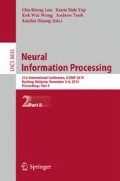Abstract
We propose a computational model for anti-Bayesian sensory integration of human behavioral actions and perception in the size–weight illusion (SWI). The SWI refers to the fact that people judge the smaller of two equally weighted objects to heavier when lifted. Many aspects of human perceptual and motor behavior can be modeled with Bayesian statistics. However, the SWI cannot be explained on the basis of Bayesian integration, and the nervous system is thought to use two entirely different mechanisms to integrate prior expectations with current sensory information about object weight. Our proposed model is defined as a state estimator, combining a Kalman filter and a H ∞ filter. As a result, the model not only predicted the anti-Bayesian estimation of the weight but also the Bayesian estimation of the motor behavior. Therefore, we hypothesize that the SWI is realized by a H ∞ filter and a Kalman filter.
Access this chapter
Tax calculation will be finalised at checkout
Purchases are for personal use only
Preview
Unable to display preview. Download preview PDF.
References
Kording, K.P., Wolpert, D.M.: Bayesian integration in sensorimotor learning. Nature 427, 244–247 (2004)
Flanagan, J.R., Bowman, M.C., Johansson, R.S.: Control strategies in object manipulation tasks. Current Opinion in Neurobiology 16, 650–659 (2006)
Brayanov, J.B., Smith, M.A.: Bayesian and “Anti-Bayesian” biases in sensory integration for action and perception in the size-weight illusion. J. Neurophysiol. 103, 1518–1531 (2010)
Todorov, E., Jordan, M.I.: Optimal feedback control as a theory of motor coordination. Nat. Neurosci. 5, 1226–1235 (2002)
Izawa, J., Shadmehr, R.: On-Line Processing of Uncertain Information in Visuomotor Control. J. Neurosci. 28, 11360–11368 (2008)
Ueyama, Y., Miyashita, E.: Optimal Feedback Control for Predicting Dynamic Stiffness during Arm Movement. IEEE Trans. Ind. Electron. 61, 1044–1052 (2014)
Simon, D.: Optimal state estimation: Kalman, H infinity, and nonlinear approaches. John Wiley & Sons (2006)
Harris, C.M., Wolpert, D.M.: Signal-dependent noise determines motor planning. Nature 394, 780–784 (1998)
Author information
Authors and Affiliations
Editor information
Editors and Affiliations
Rights and permissions
Copyright information
© 2014 Springer International Publishing Switzerland
About this paper
Cite this paper
Ueyama, Y. (2014). A Computational Model of Anti-Bayesian Sensory Integration in the Size-Weight Illusion. In: Loo, C.K., Yap, K.S., Wong, K.W., Teoh, A., Huang, K. (eds) Neural Information Processing. ICONIP 2014. Lecture Notes in Computer Science, vol 8835. Springer, Cham. https://doi.org/10.1007/978-3-319-12640-1_10
Download citation
DOI: https://doi.org/10.1007/978-3-319-12640-1_10
Publisher Name: Springer, Cham
Print ISBN: 978-3-319-12639-5
Online ISBN: 978-3-319-12640-1
eBook Packages: Computer ScienceComputer Science (R0)

